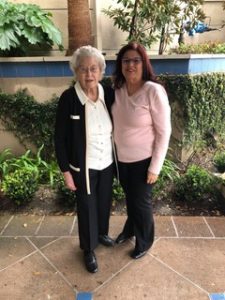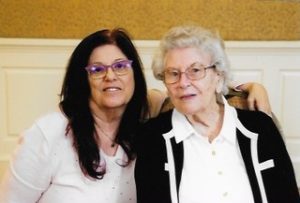Trina O’Quinn Shares Her List of Things You Shouldn’t Say to Someone Who Is Grieving
By Trina O’Quinn for the NABBW
“Life is what happens to you while you’re busy making other plans”
~ John Lennon, lyric from “Beautiful Boy,” from his last album, ‘Double Fantasy,’ with Yoko Ono.
My intention was to follow up on my last blog post by describing types of journals one could use throughout life. Then on January 2, 2022, my mother died at age 97. She was healthy, her mind was still sharp, but her body started shutting down. So when the grieving started, I changed my plan and decided to write about what the grief of losing my mother has taught me so far. I’ll get back to journaling soon…

Trina with her Mother
When my mother died, my daughter and I were at her side. She and my granddaughter were there for two weeks, but then had to go home. I’ve spent the last two months after her passing her, sorting through her things, and taking care of all legal obligations, including finances. I’m an only child, so it is my final obligation to my mother. I am doing this at age 76 with an 83 year-old husband. Thankfully, we are healthy; only our age slows us down through this process.
“The loneliest walk you’ll ever take is one down the road of grief.” – author unknown
When I read this quote in a Facebook post, my first reaction was, “THAT’S RIGHT, YOU GOT THAT.” Yes, I have a family and friends who want to support me through this grieving process. The problem is my family is traveling on their own journey of grief, and friends can’t be with me 24/7.
Most people including myself until now, do not know how to sit in silence with friends or family. (Unless it was a client when I was an active LMFT.) I want to fill that silence, fix that hurt, and move that person to the other side of healing..
In the next few paragraphs I will share why I now believe silence is the best response when there is nothing you can say that will actually relieve the grief someone you care about is experiencing.
Here is a list of things that have been said by others – and even myself – with the intent to offer support and peace to someone in grief. (In the sub-bullet immediately following each statement is what I automatically thought to myself, when I received their message.):
- “At least you had her for as long as you did. She had a long, well-lived life.”
- What I wanted to say: “I wanted her to live longer. I wanted her to see all her grandchildren and great grand children.”
- “At least now you get to know what’s really important in life.”
- What I wanted to say: “I know what is important, that is why I spent so much time with her and spent so much money for her care. That is why I miss her so much.”
- “This will make you a better person in the end.”
- What I wanted to say: “You don’t think I was good enough before she died?”
- “You won’t always feel so bad.”
- What I wanted to say: “How do you know?”
- “You’re stronger than you think.”
- What I wanted to say: “So you think I am weak if I feel sad?”
- “This is all part of the plan.”
- What I wanted to say: “It wasn’t in my plans. I wanted to give her a 100 year old birthday party.”
- “Everything happens for a reason.”
- What I wanted to say: “What possible reason could explain taking my Mom and making her feel less independent before she died?”
- “She wouldn’t want you to be sad.”
- What I wanted to say: “Maybe not and it still hurts to lose someone you love.”
- “Can I help?”
- What I wanted to say: “Yes, you can sit with me in silence and hold my head when I cry. I cannot hold your feelings at this time I am dealing with my own.”
- “I’m sorry.”
- What I wanted to say: “Why are you sorry? You didn’t take her from me.”
- “God wanted her home.”
- What I wanted to say: “Well, I wanted her here and healthy.”
- “You’re free now and your bills will be reduced.”
- What I wanted to say: “I know, and perhaps you are correct, but I still miss the Mom I knew.”
I am aware that each of these statements was said with the goal of giving comfort, and I have said some of them myself. But now in receiving them, I realize that I also heard an implied second half to each sentence: “…so stop feeling so sad.” I heard these sentences said in a tone that actually – though unintentionally – dismisses or diminishes the pain.
It erases what is true now in favor of some alternative experience where I might feel better after hearing what they have said. It implies that it is not okay to feel how I feel, and that my feelings must be changed.
Elizabeth Kubler-Ross’s famous stages of grief were only meant for accepting death. They were based on her work with terminally ill patients, and cannot, and were not supposed to, replace the experience of grief and loss. “There is no closure to grief. Just a beginning, a middle and the rest of your life.” Grief will be integrated into your being and will walk with you as long as you live.

Trina with her Mother
This has been a huge life lesson for me. From now on when someone in my life has a death, I will say nothing, just wait for them to reach out to me. I will repeat what I started out this blog with: “The loneliest walk you’ll ever take is the one down the road of grief.”
I have accepted that it is okay that I’m not okay. I’m moving through the grief and honoring the milestones such as her birthday, which was March 6. I honored her by reading her favorite author, sang her favorite songs, cried some, and told her I loved and missed her.
Previously, my Mother taught me to be persistent, tenacious, and strong. Now she is teaching me that love never dies.
Trina O’Quinn was an actively licensed (California License # LMFT27407) Marriage and Family Therapist. Entering the profession as an older adult, Trina was in private practice for 30 years. During her career, she was a lecturer at California University Dominguez Hills, in the Marital and Family Therapy Program, where she supervised many students and mentored many associates.
Now retired, Trina keeps busy enjoying needle arts, reading, journaling and writing, as well as singing with a women’s chorus, peer networking, volunteering at a senior living center and reconnecting with old friends.


